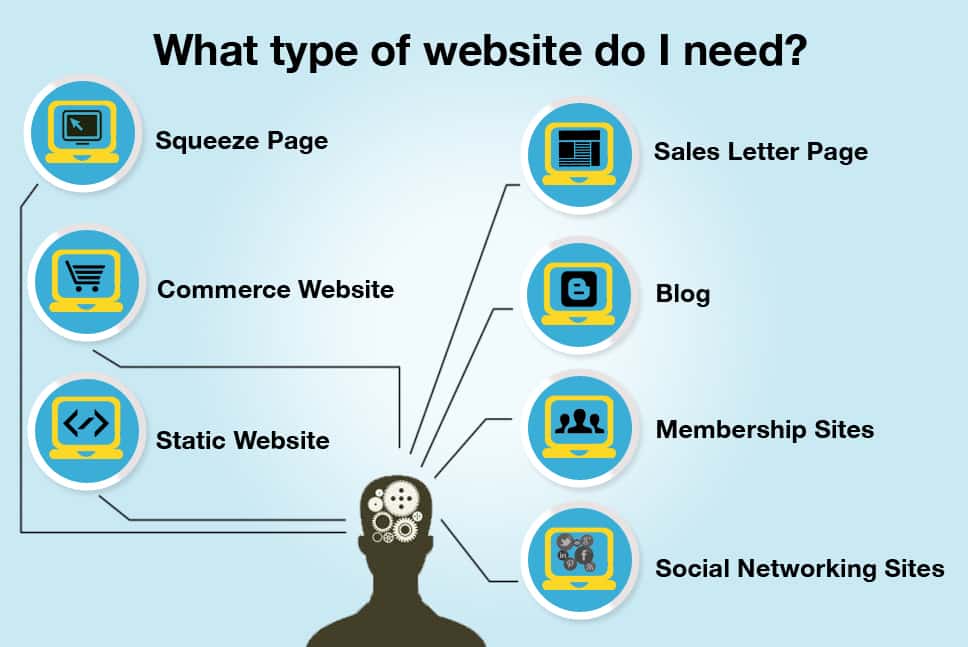What kind of website do you need?

So, you’ve come to your senses and realised that not having a website for a business in 2021 is a huge mistake. Now, the question is, what type of website do you need? From a layperson’s perspective, the amount of options can seem overwhelming. WordPress, Squarespace, Wix, Shopify, Webflow, hand-coded… The list goes on. I hope this article will shed some light on the topic and help you make your choice.
So, first question to ask yourself is “What is the main purpose of my website?”. I will quickly go through the 3 main categories that websites tend to fall in to.
Brochure / Marketing sites
If you just need a site to show off your stuff and provide information, then a simple, static, HTML/CSS handcoded website will be the optimal choice. This is how websites have been made since the 1990s and have stood the test of time. As the world of web development evolves, there are always new features and guidelines being added by the World Wide Web Consortium (W3C). Nowadays pretty much any design one can imagine can be built in HTML and CSS.
Sites built this way, without relying on frameworks or page-builders, should be very fast, secure, SEO-friendly and super cheap to host. There are a massive amount of ready-made templates and example sites on the net to draw inspiration from, so development will often be very quick.
These sites are perfect for small business who need an online presence, but don’t require e-commerce, a Content Management System, a user database, or complicated functionality like forums or chatrooms.
Here at Dublin Web Dev, we specialise in creating such websites for small businesses. We do it quickly, professionally and affordably!
E-Commerce sites
If you are setting up an online shop, with a large variety of products, then Shopify will be your best bet. Shopify was intentionally built for this purpose, and their checkout system, customer support, and capabilities for things like special offers and discounts, is unrivalled. It is also fairly easy to set up a basic Shopify site yourself, without any coding knowledge, as they have lots of ready-made templates for you.
If speed is of the essence, then a skilled developer will be able to build a site using Gatsby or Next.JS and include a Shopify plugin, which will shave milliseconds off your loading times.
WordPress also has a decent WooCommerce plugin, which many companies use to run their online shopping. Webflow has similar online shopping capabilities.
All of the above options cost money for hosting, and often take a cut of your online sales also. The cost-benefit ratio is worth it, however, as building your own checkout system from scratch, even with the help of a developer, is a massive undertaking, and when dealing with people’s credit card details, it is a better idea to go with a tried and trusted system.
Blog sites
A skilled developer will be able to set up a blog on a handcoded HTML/CSS site (like the one you’re currently reading), but if you don’t know how to code, and want your own blog, then WordPress is the most obvious choice. WordPress was invented as a blog-publishing system, has been around for decades and has a large community of developers and supporters who continue to update it.
As WordPress user’s demand for more options grew, WordPress evolved to become a fully functioning CMS, page-builder and E-Commerce platform, but it wasn’t specifically designed for any of these purposes and isn’t the best option, performance-wise. However, it’s user-friendliness ensures that it has remained popular with the general public.
It is easy for anybody to set up a blog on WordPress and change the content, fonts, images, etc. It will cost some money for hosting, and perhaps more if you want to buy a premium theme or some plugins. These plugins need to be monitored and updated regularly or issues can arise. However, if you are going to be blogging regularly, this is the most sensible choice.
Conclusion
I hope this article has shed some light on what type of website you need. In most cases, it is best to consult the help of a professional before you make your choice. Whilst it is possible to “switch” from a Wordpress site to a Shopify site, or from HTML/CSS to Wordpress, it will be time-consuming and requires lots of messy code to be untangled. If you are still unsure, we’d love if you reached out to us and we can give you some more advice, free of charge!